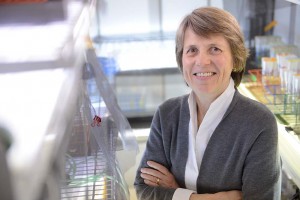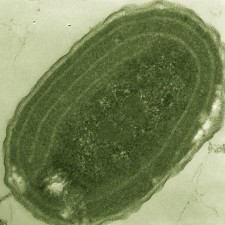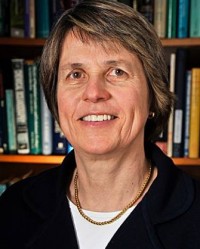Featured Stories | July 22, 2015
Penny Chisholm Named Institute Professor
By Cassie Martin

It’s been a banner year for MIT Biologist Sallie “Penny” Chisholm. In May, she received the prestigious Killian Award in recognition of her extraordinary research accomplishments. Now, she’s been named Institute Professor—MIT’s highest faculty honor.
The position of Institute Professor was established to recognize “exceptional distinction by a combination of leadership, accomplishment, and service in the scholarly, educational, and general intellectual life of the Institute and wider community,” wrote Provost Martin Schmidt and MIT Faculty Chair Steven Hall in an email announcing the appointment of Chisholm and two other MIT faculty members. Chisholm joins an elite group of 13 current Institute Professors and 10 Institute Professors emeriti.
Originally from Marquette, Michigan, Chisholm received a bachelor’s in biology from Skidmore College and a doctorate in biology from the State University of New York at Albany, before arriving at MIT’s Department of Civil and Environmental Engineering as a marine ecologist in 1976.

It was here that she made her most famous discovery— prochlorococcus, the ocean’s most abundant and prolific photosynthetic bacterium. It may be small, measuring one millionth of a meter across, but it’s responsible for producing approximately half of Earth’s breathable air. Over the years and with the help of quickly advancing genomic technology, Chisholm and colleagues gained insights into just how crucial prochlorococcus is to the ocean environment and the planet as a whole.
One of the most important revelations they found was its role in moderating Earth’s climate. Without the photosynthesis of the three billion billion prochlorococcus cells inhabiting the ocean, the atmosphere’s carbon dioxide levels would be double or triple what it is currently. And there’s still more to discover. The fluorescent red microbe may yield new kinds of antibiotics or even a new way of producing biofuels, she said.
Chisholm is not only a dedicated scientist, but also a skilled communicator, teacher, and leader. She was the founding director of MIT’s Earth System Initiative, served as associate chair of the faculty from 1987 to 1989, has held a joint appointment in Biology since 1993, and has taught Introductory Biology for more than two decades. Beyond academia’s ivory tower, Chisholm is also passionate about communicating science with the public, as evidenced by her three children’s books covering topics such as photosynthesis, ocean ecology, and climate change.
Although Chisholm isn’t a stranger to such awards and honors—she received the National Medal of Honor in 2013—she is incredibly humble. “[Being named Institute Professor] is not just about me, but my field, recognizing what I do and my students do as being something of value,” she told MIT News. “That makes me as happy as the honor itself.”






